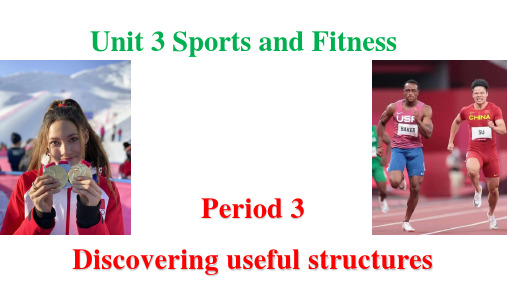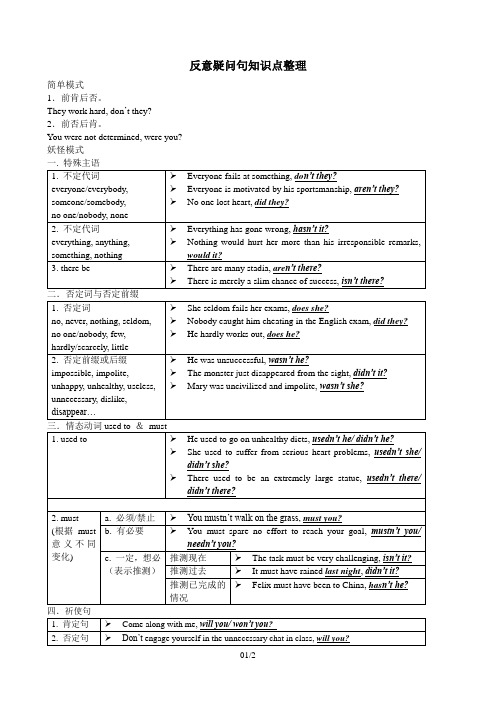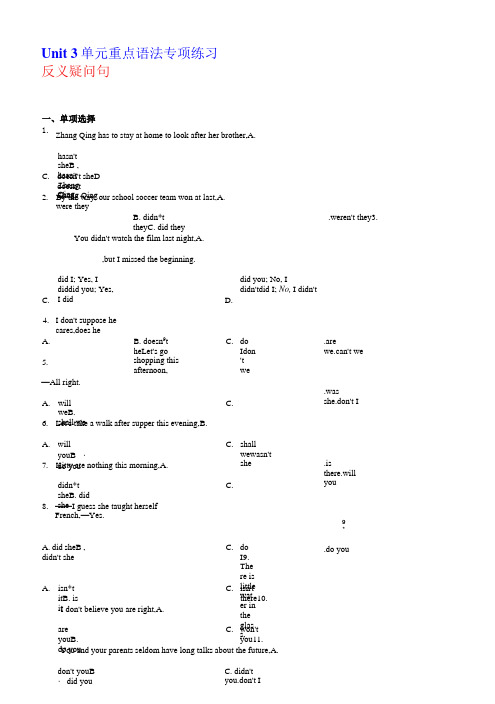unit3 反义疑问句
人教版英语八年级下册Unit3 反义疑问句

八、分清’d? ’s?
1. He’d like a cup of tea, wouldn’t he?
2. You’d better get up early, hadn’t you? 3. She’d rather stay at home and have a good sleep,
陈述部分有must,如果must意为“必须”,疑问部分用 needn’t;如果含有mustn’t意为“不允许,禁止”时, 疑 问部分用must。
must在表"推测"时,根据其推测的情况来确定反意疑问 句。
He must be there now, isn't he ? It must be going to rain tomorrow, won't it ?
_a__r_e_n_’_t__th__e_r_e_____?
• 3.There will not be any classes tomorrow,
w__i_l_l _t_h_e_r_eere wasn’t anything new on TV last night,
_w__a_s_t_h__e_r_e___? Yes, there was a new TV play.
It was very interesting.
I must save money, _n_ee_d_n_’_t _I ___?
He mustn’t park the car here, _m_u_s_t _h_e_?
六、主语从句,不定式,动词ing形式 做主语→it
1. What you need is more practice, isn’t it?
2. To learn English well isn’t easy, is it?
M1U3-反义疑问句-精华

Let’s do some exercises
I’m your friend, ______ aren’t ______? I There aren’t any books on the desk, ____ ____? are there Turn off the light, ______ will ______? you will you Don’t make a noise, _______ _____?
Unit 3 Module one
• 1.Looking good is important to women,
isn’t it
?
• 2.We shouldn’t be ashamed of the way we look,
should we
?
是由一个陈述句加上一个短问句而构成的。 代词 反意疑问句的基本构成形式: 陈述句, 助动词(肯定或否定)+ 主语? ①She often has lunch at school,doesn’t she ? ②You didn’t lie, did you ? 基本规则:前肯后否,前否后肯 前后时态一致
分用didn't +主语或 usedn't +主语。
There is something wrong with your isn't there watch, _______?
There will not be any trouble,will _______? there
5)陈述部分是"there be"结构的,疑问部
It is a fine day. Let’s go fishing, _______? shall we Let us do this job,_______? will you
【同步语法】新教材必修一Unit 3 语法:反意疑问句

【同步语法】新教材必修一Unit3语法:反意疑问句反意疑问句一、理解概念反意疑问句又叫附加疑问句,是指当提问的人对前面所叙述的事实不敢肯定,而需要向对方加以证实时所提出的问句。
反意疑问句是由陈述句和附在其后的简短问句组成。
其中简短问句是对陈述句所说的事实或观点提出疑问,起证实作用,一般用于证实说话者所说的事实或观点。
二、语法规则(一)反意疑问句的分类反意疑问句根据其肯定及否定形式一般可分为两类:肯定陈述+否定疑问及否定陈述+肯定疑问。
The basketball match was wonderful, wasn't it?篮球比赛很精彩,是吗?Your father didn't go to the basketball match with you, did he?你爸爸没有和你一起去看篮球赛,是吧?(二)简短问句的特征及构成1.特征简短问句与陈述句之间要用逗号隔开,且它的主语总是使用代词,这个代词与前面陈述句中的主语要保持一致。
其动词要根据陈述句的谓语而定。
一般情况下,肯定的陈述句后跟否定的简短问句,否定的陈述句后跟肯定的简短问句,即“前肯定后否定,前否定后肯定”。
Mary is not good at playing the violin, is she?玛丽不擅长拉小提琴,是不是?You like jogging, don't you?你喜欢慢跑,是吗?2.构成简短问句由“系动词/助动词/情态动词+人称代词”组成。
助动词及人称代词要根据前面陈述句的动词时态和人称来选择,前后两部分的人称和动词时态要保持一致。
(1)简短问句的动词通常是陈述句谓语中的(第一个)助动词或情态动词,或者是系动词be。
His sister is the manager of the newly founded company, isn't she?他姐姐是这家新建公司的经理,是吗?The elderly headmaster can't use computer, can he?这位年老的校长不会使用电脑,是吗?They have finished their homework, haven't they?他们已经完成作业了,是吗?The woman singer had left when you arrived, hadn't she?当你到达时,那个女歌手已经离开了,是吧?(2)若陈述句中的谓语不含be、助动词或情态动词时,要用相应的do/does/did 构成简短问句,切记前后时态要保持一致。
Unit 3 第3课时 Grammar语法 反意疑问句高一英语必修一(人教版2019)

3.陈述句的主语是nobody, no one, everyone, somebody等不定代词时,反意疑问部分的主语多用 he/they。 例:Everyone knows him, don’t they/ doesn’t he? 陈述句的主语something,nothing,anything,everything 等不定代词时,反意疑问部分的主语多用it。 例:Nothing in the world is difficult, is it?
?
4. Everyone should be on time, shouldn’t they ?
5. What he said isn’t true,
is it ?
6. She dislikes sports, doesn’t she ?
7. There was a mountain, wasn’t there ?
— They don’t work hard, do they? — Yes, they do./ No, they don’t.
不,他们工作努力。/ 是的,他们工作不 努力。
2.当陈述句部分是否定结构,反意疑问句用肯定式提问时 ,回答yes或no与汉语的意思正好相反。这种回答时,yes 要翻译为“不”,no翻译为“是” 例:---Lucy didn't attend the meeting, did she? 露西没有参加会议,是吗?
Unit 3 Sports and Fitness
Period 3 Discovering useful structures
All sports for all people. —Pierre de Coubertin
新人教版必修一Unit3 重点语法:反义疑问句学习讲义+练习题

语法:反意疑问句一、基本用法与结构反意疑问句由“陈述句+简略疑问句”两部分组成,第一部分提出一种看法,第二部分用来质疑或表示证实。
陈述部分与疑问部分的动词时态和动词性质应保持一致,而且肯定和否定形式彼此相反,即陈述部分为肯定式时,疑问部分用否定式,陈述部分为否定式时,疑问部分用肯定式:He likes English, doesn’t he? 他喜欢英语,是吗?He doesn’t like English, does he? 他不喜欢英语,是吗?【注】1. 若陈述部分含有seldom, hardly, never, few, nothing等否定词或半否定词,其疑问部分要用肯式:He has few friends here, has he? 他在这儿几乎没什么朋友,是吗?She said nothing, did she? 她什么也没说,是不是?2. 若陈述部分含有带否定前缀的词,疑问部分仍用否定式:It is unfair, isn’t it? 这不公平,不是吗?It is impossible, isn’t it? 那是不可能的,是吗?二、反意疑问句的主语问题1. 基本原则:疑问部分的主语应与陈述部分主语一致,且只能是代词:Mary is a nurse, isn’t she? 玛丽是护士,对吗?2. 当陈述部分为there be句型时,疑问部分仍用there作“主语”:There was nothing in the room, was there? 房间里什么也没有,是吗?3. 当陈述部分的主语是指示代词时,疑问部分用it, they等代词:That is a new car, isn’t it? 这是一辆新汽车,是吗?4. 当陈述部分的主语是复合不定代词时,若陈述部分的主语为somebody, someone, everyone, everybody, no one, nobody等复合不定代词,其反意疑问句的主语在正式文体中用he,在口语或非正式文体中通常用they:Nobody was late, were they? 没有一个人迟到,是吗?5.当陈述部分的主语是something, anything, nothing, everything等复合不定代词时,其反意疑问句的主语要用it:Everything is ready, isn’t it? 一切都准备好了吗?Nothing is important, is it? 没有什么重要的,不是吗?三、陈述部分有动词have的反意疑问句1. 当have 为助动词时,其反意疑问句沿用同样的助动词:He has already left, hasn’t he? 他已经离开了,是吗?2. 当have 为实意动词时,要分两种情况:① 若表示“所有”,反意疑问句可以用have,也可以用do:He has a lot of friends here, hasn’t [doesn’t] he? 他在这儿有许多朋友,是吗?但是若陈述部分用的是have的否定式,反意疑问句用have 还是用do,取决于陈述部分的动词形式:He hasn’t any money, has he? 他没有钱,是吗?He doesn’t have any money, does he? 他没有钱,是吗?① 若表示“吃”、“玩”等意思,反意疑问句要用do:He has supper at 5, doesn’t he? 他5点吃晚餐,是吗?He had a good time at the party, didn’t he? 他在晚会上玩得很开心,是吗?3. 当用于have to时,通常也有两种可能:若表示经常性的行为,则多用加助动词do的形式;若表示特定的行为,则多用have:He often has to get up early, doesn’t he? 他经常要早起,是吗?He has to go to bed late tonight, hasn’t he? 他今晚要迟睡,是吗?四、含情态动词的反意疑问句1. 基本原则:在通常情况下,当陈述部分含有情态动词时,疑问部分会重复前面同样的情态动词:He can speak English, can’t he?他会说英语,是吗?We shouldn’t go, should we? 我们不应该去,对不对?2. 当陈述部分含有must时,要分两种情况:① 若must表示“必须”或“有必要”,疑问部分用mustn’t 或needn’t:You must leave at once, mustn’t [needn’t] you? 你必须(有必要)马上离开,是吗?但是若陈述部分有mustn’t表示禁止,疑问部分要must:You mustn’t laugh, must you? 你不准笑,知道吗?① 若must表示推测,疑问部分不能用must,而应根据must后的动词结构采用相应的动词形式:He must be tired, isn’t he? 他一定累了,是吗?五、陈述部分为祈使句的反意疑问句1. 基本原则:若陈述部分为祈使句,疑问部分通常用will you:Please help us, will you? 请帮帮我们,好吗?Come with us, will you? 同我们一起去,好吗?Don’t forget to post the letter, will you? 请别忘了寄信。
牛津高中英语模块一unit3Grammar and usage反意疑问句

It will rain tomorrow, __won’t___ it? Yes, it will.是的,会下雨。 No, it won’t.不,不会下雨。
Obama never speaks English, _d__o_e_s__h_e___? Yes, he does
There are two cakes on the plate, _a_r_e_n__’_t_t_h__e?re There will be a party in Lily’s housew, _o__n_’_t_t_h__e_r?e
I am attractive, _a_r_e_n__’t__I__?
Nothing is impossible,___is__it_______?
Everything can be done well as long as you make effort to do it,___c_a_n_’_t _it____?
1. 当陈述句带有seldom, hardly, never, rarely, little, nobody, nowhere, few, nothing 等否定词时,疑问句部分的动词 用肯定形式
(特殊疑问句)
• Do you come from America or
Canada?
(选择疑问句)
• It is a nice day, isn’t it?
(反意疑问句)
When do we use ?
1. To start a conversation It’s a nice day, isn’t it?
You still go to the gym every day, don’t you?↘ —ask for agreement
unit3 反义疑问句

特殊用法8 陈述部分是感叹句,反义疑问句的用法:
isn’t he • What a clever boy, ______________? isn’t he • How rude the boy is, ______________?
特殊用法9
如果陈述部分的主语是 this/that 或 these/those, 反 义疑问句的主语就用it或they.
反意疑问句结构: 结构一: 前肯 + 后否 eg. Lions are scary, aren’t they? 狮子很恐怖,不是吗? 结构二: 前否 + 后肯 eg. Lions aren’t scary, are they? 狮子不恐怖,对吧?
3. 在回答反义疑问句时,不管问题的提 法如何,若事实是肯定的,就要用yes, 事实是否定的,就要用no。这和汉语不 一样,应特别注意。例如: You’re not ready, are you? 你没有准备好,是吧? Yes, I am. 不,我准备好了。 No, I’m not. 是的,我没有。
行为动词: 1. It often rains here, _________? doesn’t it 2. He likes soccer, _________? doesn’t he don’t you 3. You have a headache, _________? 4. I called you yesterday, _______? didn’t I 其它动词: 1. You will go to America, _________? won’t you 2. We have ever been to Shanghai, __________? haven’t we
8A Unit 3 反意疑问句课件

反意疑问句1. 陈述部分用否定词或半否定词 no ,nothing, nobody, never, few, seldom,hardly, rarely, little 等否定含义的词时,疑问部分用肯定形式。
例如: He is never late for school, is he?他上学从不迟到,是吗?2、陈述部分的谓语是used to 时,疑问部分用didn’t +主语或 usedn’t +主语。
例如:He used to take pictures there, didn’t / usedn’t he? 他过去常常在那儿拍照,是吗?You used to sleep with the windows open, usedn’t/ didn’t you?你过去常常开着窗户睡觉,是吗?3. 陈述部分为祈使句时,祈使句后加附加问句,不表示反意,而表示一种语气。
其结构为:否定祈使句 + will you?肯定祈使句 + will / won’t you? 例如:Don’t do that again, will you? 不要再那样做了,好吗?Go with me, will you / won’t you? 跟我走,好吗? 注意:Let’s 开头的祈使句,后用shall we? Let us 开头的祈使句,后用will you? 例如: Let’s go and listen to the music, shall we? 让我们去听音乐,好吗?Let us wait for you in the reading-room, will you? 让我们在阅览室等你,好吗?4、如果陈述句部分的谓语含有带否定前缀dis-, un-, im-或否定后缀-less的词(dislike, discourage,be unfair/ untrue/ unable, etc.),仍按肯定句处理,其反问部分一般用否定式。
Unit3反义疑问句知识点整理讲义-高中英语人教版必修第一册

1.否定词
no, never,nothing,seldom,
no one/nobody, few,
hardly/scarcely,little
She seldom fails her exams,does she?
Nobody caught him cheating in the English exam,did they?
There used to be an extremely large statue,usedn’t there/ didn’t there?
2. must
(根据must意义不同变化)
a.必须/禁止
You mustn’t walk on the grass,must you?
b.有必要
You mustspare no effort to reach your goal,mustn’t you/ needn’t you?
I don’t think you have figured out his intention,haveyou?
I don’t believe the tourist spot is appealing,is it?
如出现否定转移,反意句用肯定形式
3.非第一人称+
(believe, suppose,
Mary was uncivilized and impolite,wasn’t she?
三.情态动词used to&must
1. used to
He used togo on unhealthy diets,usedn’t he/ didn’t he?
She used to suffer from serious heart problems,usedn’t she/ didn’t she?
18-19 Unit 3 Section Ⅲ Grammar——定语从句(Ⅲ)和反意疑问句

18-19 Unit 3 Section ⅢGrammar——定语从句(Ⅲ)和反意疑问句引导词(关系词) 先行词在定语从句中作的成分关系代词who 人主语whom 人宾语关系代词which 物/整个主句的意思主语/宾语whose(=ofwhom或ofwhich)人/物定语as 人/物/整个主句主语/宾语关系副词when 时间名词时间状语where 通常是地点名词地点状语查尔斯·史密斯去年退休了,他曾是我的老师。
Xiao Wang,whom they often talk about,is going to America next month.(宾语)他们经常谈到的那个小王下个月要去美国了。
There are many high buildings along the river,where there used to stand rows of trees.(地点状语)沿河有很多的高楼,过去那儿是成排的树。
In his office there are nine clerks,the youngest of whom is Mr.Liu.(介词宾语)他办公室有9个职员,其中最年轻的是刘先生。
The earth goes around the sun,as we all know.(宾语)众所周知,地球绕着太阳转。
[名师点津](1)在非限制性定语从句中不能用that来代指人或物,而应当用who/whom 指人,用which指物。
指人和指物的关系代词在非限制性定语从句中作宾语时也不能省略。
指人作宾语时只能用宾格whom,不能用who替换。
(2)非限制性定语从句不能用why引导,常用for which代替why。
[即时演练1]用适当的关系词填空①China Today attracts a worldwide readership,which shows that more and more people all over the world want to learn about China.②The books on the desk,whose covers are shiny,are prizes for us.③John invited about 40 people to his wedding,most of whom are family members.3.as和which引导非限制性定语从句的区别as,which引导非限制性定语从句指代整个句子引导词as which位置可位于主句之前、之中或之后引导的从句不能位于主句之前意义正如这,那功能连接上下文的作用,表达说话人的观点、看法,并指出主句内容引导的从句在意义上相当于一个并列句正如今天的报纸上说的,我们必须改进工作作风。
高中人教版英语必修一 unit 3 反义疑问句

高中人教版英语必修一 unit 3 反义疑问句Title: How to use Negative Questions in Unit 3 of high school “People's Education Edition English Book One”?As one of the basic language points in Unit 3 of high school People's Education Edition English Book One, negative questions play an important role in daily communications. In this article, we will elaborate on the usage of negative questions and summarize the key points to help students fully understand and apply them in various scenarios.I. Definition of Negative QuestionsNegative questions are formed by adding a tag question after a negative statement, indicating that the speaker expects confirmation or denial of the statement.II. Formation of Negative Questions1. For affirmative statements:Auxiliary verb+ Subject + Main verbExample: They are students, aren't they?2. For negative statements:Auxiliary verb+ Subject + not+ Main verbExample: He is not a teacher, is he?Note: Don’t use an auxiliary verb when the main verb is ‘be’.Example: You’re not a te acher, are you?3. Special cases:a) Questions with no auxiliary verbExample: Nothing happened, did it?b) Using ‘do’ as the auxiliaryExample: You don’t understand it, do you?III. Usage of Negative Questions1. Seeking confirmationExample: These aren't your notes, are they?2. Checking informationExample: You haven't seen him today, have you?3. Indicating a lack of interestExample: You're not going to the party tonight, are you?4. Softening suggestionExample: You wouldn't mind if we left early, would you?IV. ConclusionNegative questions are commonly used in our daily communication. As a language point in Unit 3 of high school People's Education Edition English Book One, it is necessary for students to master it. Formation and usage of negative questions can be improved through practice and application.。
Unit3Sports+and+Fitness+反义疑问句 高中学业水平合格性测试考前复习

二、基础练习 完成下列附加疑问句。 1. Kurt listened patiently, but then he finally smiled and said, “You don’t have a personal plan for growth, do you?” “______N__o____________, I admitted.
10. If you want help — money or anything, let me know, ______w__il_l_y_o_u________?
11. Brian told you there wasn’t anyone in the room at that time, ____d_id_n_’_t _h_e__________?
4. As far as I know, life must be pretty tough for his family now, ______i_s_n_’t_i_t_________?
5. Guess what? My mother’s decided to go back to school, ______h_a_sn_’_t_s_h_e_______?
14. His wife had the front door painted green yesterday, ______d_id_n_’_t_s_h_e_______?
15. If you had come yesterday, you might have seen him, ___m_i_g_h_t_n_’t_y_o_u________?
8. He used to tell you that readers were leaders, __u_s_e_d_n_’t_h_e_/_d_i_d_n_’_t _h_e__?
Unit 3 单元重点语法Grammar反义疑问句-2022-2023学年高一英语必修第一册单元重难

Unit 3单元重点语法专项练习反义疑问句一、单项选择1. Zhang Qing has to stay at home to look after her brother,A.hasn'tsheB ,hasn'tZhangQingC. doesn't sheD. doesn't Zhang Qing 2. By the way, our school soccer team won at last,A. were theyB. didn*ttheyC. did they.weren't they3. You didn't watch the film last night,A.C. 4. A. 5. ,but I missed the beginning.did I; Yes, I diddid you; Yes, I did I don't suppose hecares,does heB. doesn 9t heLet's go shopping this afternoon, —All right.A. will weB.shall we6. Let's take a walk after supper this evening,B. D.C. C.A. will youB ・ do you C. 7. Kitty ate nothing this morning,A. didn*t sheB. didshe C.8. ——I guess she taught herselfFrench,—Yes.A. did sheB , didn't she C. did you; No, Ididn'tdid I; No, I didn'tdoIdon'tweshallwewasn'tshedoI9.There islittlewat er intheglas s, A. isn*t itB. is it C. isn't there10.I don't believe you are right,A. are youB. do you C. won'tyou11.You and your parents seldom have long talks about the future,A.don't youB ・ did you C. didn'tyou.don't I .are we.can't we .was she.don't I .is there.will you 9 * .do you【解析】考查反意疑问句。
M1unit3反意疑问句

Question tags are short questions that
come at the end of statements.
2. Look at the following examples and tell in what different situations the question tags are used. Example 1: It’s a lovely day, isn’t it? Situation 1: to start a conversation Example 2: Neither of you has heard the news, have you? Situation 2: to request information in a more polite way.
3. There is no light in the dormitory. They must have gone to the lecture, __? A. didn’t they B. don’t they C. mustn’t they D. haven’t they 4. Bill’s aim is to inform the viewers that cigarette advertising on TV is illegal, ______? A. isn’t it B. is it C. isn’t he D. is he
语法:反义疑问句-Unit 3-2021-2022学年上学期高一英语(人教版2019)

反义疑问句讲解及练习【概念】反意疑问句是附加在陈述句之后,对陈述句所表示的事实或观点提出疑问的句子.附加疑问实际上是一种简略的一般疑问句。
反意疑问句的结构:陈述句(主语+谓语……),+助动词/情态动词/be动词+主语(代词形式)?说明:陈述句部分如果是肯定句,反意疑问句,疑问句部分的助动词/情态动词/be动词+not (否定提问);如果陈述句部分是否定句,反意疑问句,疑问句部分用肯定式提问。
1. 当陈述句的主语为:this,that,everything,anything,something,nothing等时,反意疑问句的主语用it。
This is the man you are going to see,isn't it?这就是你要见的那个人,对吗?That's a lovely dress,isn't it?那是一套美丽可人的衣服,不是吗?Under the direction of Professor Lee,everything goes well,doesn't it?在李教授的指导下,一切运行正常,不是吗?Something is the matter with his voice,isn't it?他的嗓音有些不对头,不是吗?Anything that smells of cold war should be avoided,shouldn't it?凡有冷战意味的言行都应避免,对吗?Nothing can excuse such carelessness,can it?如此疏忽大意是绝不能原谅的,不是吗?2. 当陈述句的主语为:anyone,anybody,everyone,everybody,somebody,someone,nobody,no one,these,those 等时,反意疑问句中的主语用they。
Anyone over eighteen years of age counts as adult,don't they?凡是超过18岁的都算成年人,不是吗?Anybody can enter for the competition,can't they?任何人都能参与竞争,是吗?Everyone pronounced the dinner to be very good,didn't they?人人都称这顿饭菜好,不是吗?Everybody stands up when the judge enters the court,don't they?法官进入法庭时所有的人都起立,对吗?Somebody tried to gatecrash,didn't they?有人想无票入场,是不是?Someone stole his wallet on the bus,didn't they?有人在公共汽车上偷了他的钱包,是不是?Nobody says a word about the incident,do they?对于这场事故人们守口如瓶,是吗?No one could match the skill of the well-known archer,could they?没有哪个人的技艺能比得上那位出名的射箭运动员,不是吗?These are the parcels full of the effects of dead soldiers,aren't they?这些是装满士兵遗物的包裹,对吗?Those who were once for him have turned against him,haven't they?那些原来支持他的人现在转而反对他,是吗?3. 当陈述句主语为such时,反意疑问句的主谓语的数随主句谓语而定。
- 1、下载文档前请自行甄别文档内容的完整性,平台不提供额外的编辑、内容补充、找答案等附加服务。
- 2、"仅部分预览"的文档,不可在线预览部分如存在完整性等问题,可反馈申请退款(可完整预览的文档不适用该条件!)。
- 3、如文档侵犯您的权益,请联系客服反馈,我们会尽快为您处理(人工客服工作时间:9:00-18:30)。
7. You won’t go to USA, _________? will you 8. There isn’t a boy in our classroom, _________? is there 9. There weren’t many cars in the street, ___________? were there 10. Don’t smoke, __________? will you 11. Let’s not do it, _________? shall we
特殊用法8 陈述部分是感叹句,反义疑问句的用法:
isn’t he • What a clever boy, ______________? isn’t he • How rude the boy is, ______________?
特殊用法9
如果陈述部分的主语是 this/that 或 these/those, 反 义疑问句的主语就用it或they.
will you 5. Don’t leave now, ________________?
特殊用法2 情态动词的反义疑问句
陈述句+情态动词的简短否定/ 肯定+主语? • 1) He can play the piano,_________? can’t he
shouldn’t he • 2) He should go right now, __________? can they • 3)They can’t finish it, ___________?
doesn’t she • 1.She says that I did it, ______________? • 2. I don’t think she cares, __________? does she
Unit 2 It’s a nice day, isn’t it? 课文展示 Section A 2d
特殊用法4
陈 述 部 分 如 果 有 否 定 意 义 的 词 , 如 : hardly ( 几乎 不 ) , never ( 从 不 ) , nothing, few, little, no, seldom ( 很 少 ) , nowhere,rarely, too…to(太…以至于不能) 等, 这时疑问部分要 用肯定形式。
特殊用法7 主语是 everything, something, anything, nothing 等不 定代词时,反意疑问句的主语一般用it指代。
• 1.Nothing is important for him, is it? • 2.Something is wrong with your computer, isn’t it ______________? isn’t it • 3.Everything is ready for the test, __________? 一切都准备好了,对吗?
特殊用法1 ---祈使句的反意疑问句:
在祈使句后面附加问句,以加强语气或使祈使 句听起来较委婉、客气。附加问句可选用 “ will you? ”“won’t you?”。 祈使句为否定结构时,附加问句一般只用 “will you?”. 陈述句为 “Let’s…” 结构时, 表示建议,其意思 包括对方,即“让我们(你我双方)”附加问句一 般用 “shall we?” 。 陈述句为 “Let us…” 结构时, 表示请求,其意 思不包括对方,即“你让我们…(You let us)”,附 加问句一般用 “will you?”
反意疑问句结构: 结构一: 前肯 + 后否 eg. Lions are scary, aren’t they? 狮子很恐怖,不是吗? 结构二: 前否 + 后肯 eg. Lions aren’t scary, are they? 狮子不恐怖,对吧?
3. 在回答反义疑问句时,不管问题的提 法如何,若事实是肯定的,就要用yes, 事实是否定的,就要用no。这和汉语不 一样,应特别注意。例如: You’re not ready, are you? 你没有准备好,是吧? Yes, I am. 不,我准备好了。 No, I’m not. 是的,我没有。
---祈使句
பைடு நூலகம்
1. Sit down please, _______________ will / won’t you ?
2. Please call me, _________________? will / won’t you
3. Let’s go home, ________________ ? shall we will you 4. Let us go home, ________________ ?
特殊用法3---There be句型的反意疑问句。
陈述句为There be结构时,附加问句仍用there。
• 1.There is a famous doctor in your hometown, isn’t there ______________? Yes, there is. • 2.There are many visitors in Beijing now, aren’t there __________________? • 3.There will not be any classes tomorrow, will there _________________? No, there won’t. • 4.There wasn’t anything new on TV last night, was there Yes, there was a new TV play. It _____________? was very interesting.
特殊用法6
主语是everyone, someone, anyone, no one, nobody等 不定代词时,反意疑问句的主语一般用 they或 he指代。
• 1.Everyone in your family is fond of swimming, aren’t they ? 你们全家都喜欢游泳,是吗? can’t they • 2.Anyone can do that, ___________? aren’t they • 3.Someone is knocking at the door, __________? do they • 4.No one knows about it, __________?
完成下列反义疑问句。 结构二: 前否 + 后肯 1. You aren’t an actor, _________? are you 2. He isn’t a good boy, ________? is he was it 3. It wasn’t fine yesterday, ________? 4. It doesn’t rain here, __________? does it 5. His sister doesn’t have a headache, does she _________? 6. You didn’t call me yesterday, did you ___________?
行为动词: 1. It often rains here, _________? doesn’t it 2. He likes soccer, _________? doesn’t he don’t you 3. You have a headache, _________? 4. I called you yesterday, _______? didn’t I 其它动词: 1. You will go to America, _________? won’t you 2. We have ever been to Shanghai, __________? haven’t we
isn’t it • 1.This is very easy, ______________? • 2.These are your friends Tom aren’t they _______________ ?
and
Tim
特殊用法10
如果陈述部分是一个主从复合句,反义疑问句部分就看主句部分, 但 如 果 陈 述 部 分 的 主 语 是 I , 谓 语 动 词 是 think/suppose/believe/expect, 反义疑问句部分就要看从句部分 了。
同陌生人: 处理困难的情境 那是个周五的晚上,我走到大门的时候就听到了喧闹的音乐和人们的 说话声。我的朋友看到了我,走了过来。“嗨,本。感谢你来参加我的聚 会!”他说。“感谢你邀请我,看来这是一个盛大的晚会。”我回答道。 但是内心深处有种害怕的感觉。我意识到在这里我一个人都不认识。我走 向饮品桌喝点饮料。然后我局促的站在角落里,不是很清楚要去做什么。 终于我转向我身边的人做自我介绍。“你好,”我说,“我叫本。”“你 好,我是塔尼亚,”这个人羞涩地回答。接下来是长时间的沉默,因为我 一直考虑接下来该说什么。我感到越来越紧张,另一个人看上去也不舒服。 最后,唯一能说的就是,“哦,见到你很高兴。”我快速地走开了。我觉 得很尴尬,就离开了聚会。 本不是唯一经历过这种情形的人。可能以前我们大多数人都遇到过类似的 事情。在和陌生人开始对话时感到不自信是很自然的。一个好的起点是问 对方关于他或她自己的问题。或者谈论你们两人都喜欢的事物,例如,足 球或流行音乐。这样能使社交场合更轻松。那么你会很高兴去参加聚会的。
he • 1.Mr. Smith can hardly speak Chinese, can ________? she • 2.She has never been to Hong Kong,has ___________? • 3.There is nothing important in the newspaper, is there ______________? do they • 4.Few people eat wild animals now, __________? does he • 5.He knows little German, ____________ ? • 6.You have seldom met him recently, ________ ? have you
